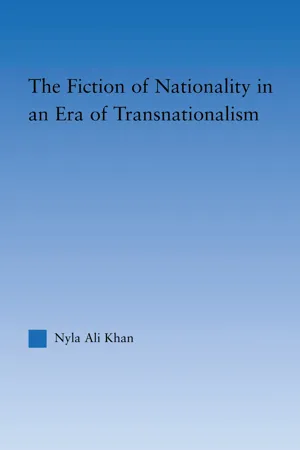
- 140 pages
- English
- ePUB (mobile friendly)
- Available on iOS & Android
The Fiction of Nationality in an Era of Transnationalism
About This Book
The book focuses on the representation of South Asian life in works by four Anglophone writers: V. S. Naipaul, Salman Rushdie, Amitav Ghosh, and Anita Desai. Concentrating on the intertwined topics of nationalism, transnationalism, and fundamentalism, the book addresses the dislocation associated with these phenomena, offering a critical dialogue between these works and contemporary history, using history to interrogate fiction and fiction to think through historical issues. Despite all their differences, the works of these authors delineate the asymmetrical relations of colonialism and the aftermath of this phenomenon as it is manifested across the globe. The binary structures created by the colonial encounter undergo a process of dialectical interplay in which each culture makes incursions into the other. This dialogic interplay becomes the basis for strategies that enable transnational and postcolonial writers to reimagine themselves and their world. The book shows, for instance, how Naipaul articulates a sensibility created by multilayered identities and the remapping of old imperial landscapes, in the process suggesting a new dynamic of power relations in which politics and selfhood, empire and psychology, prove to be profoundly interrelated; how Rushdie encourages a nationalist self-imagining and a rewriting of history that incorporate profound cultural, religious, and linguistic differences into our sense of identity; how Ghosh is critical of the putative cultural and religious necessity to forge a unified nationalist identity, arguing that no single theory sufficiently frames the multiple inheritances of present diasporic subjectivities; and how Desai seeks to imagine a responsible form of artistic, social, and political agency. Although transnationalism, then, can have positive effects, which have been celebrated in terms such as hybridity, the book suggests why this sort of term, too, cannot be a stopping-place for our thinking about a world radically transformed by postcolonial struggles.
Frequently asked questions
Table of contents
- Cover
- Title
- Copyright
- Contents
- Acknowledgments
- Chapter One Transporting the Subject: The Fiction of Nationality in an Era of Transnationalism
- Chapter Two World Borders, Political Borders in Naipaul's Among the Believers
- Chapter Three Transnationalism as Hybridization in Rushdie's The Satanic Verses
- Chapter Four Citizenship in a Transnational Age: Culture and Politics in Ghosh's The Shadow Lines
- Chapter Five Place and the Politics of Identity in Desai's In Custody
- Conclusion
- Appendix
- Notes
- Bibliography
- Index